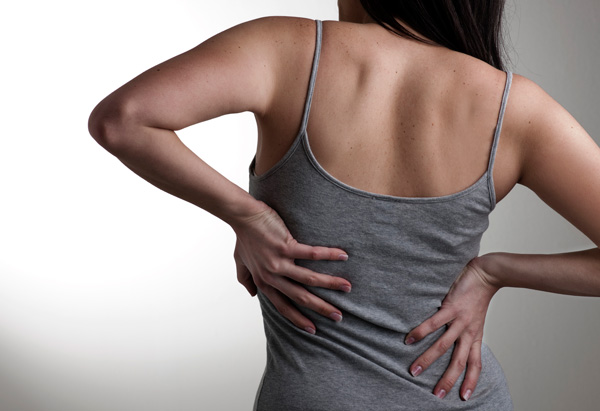Back Pain 101
It's one of the most common reasons we go to the doctor. Here's everything you need to know to help your aching back.

Photo: Thinkstock
To be human is to have a sore back. By the time we reach age 50, 9 out of 10 of us will have experienced back pain, the leading cause of disability in people under 45. Doctors prescribe everything from acupuncture to surgery to bring us relief and, as a society, we spend the same amount of money trying to cure back pain as we do cancer. If you're reading this article, you're probably desperate for your own fix. Here's our guide to what may be causing your problem and how to stop it.
Top 3 Causes of Back Pain
Spinal Problems
Herniated disc: In between our vertebrae, small sponge-like pads act as cushions to absorb everyday shocks to our spinal column. Aging and injury can cause those discs to rupture or bulge, putting pressure on the nerves in our spine and causing significant pain.
Sciatic pain: Felt in the sciatic nerve, which runs down your leg, sciatic pain can caused by pressure from a herniated disc.
Arthritis: Osteoarthritis often affects the lower back and can cause a painful narrowing of the spinal canal called spinal stenosis.
What Can Be Done
You might be surprised to learn that back surgery is the treatment of last resort. Because the structure of the spinal column is so intricate and the nerves running through it so numerous, back surgery is a risky procedure that only works about 50% of the time. Most experts recommend exhausting other approaches, which are 90% successful in reducing pain, before going under the knife.
Home Treatment
Strengthen your stomach: This will help your back muscles do their work and decrease the pressure on your spine. Try daily stomach crunches or holding "the plank" for several minutes a day if your back will allow it.
Try medication: Over-the-counter anti-inflammatories and/or prescription muscle relaxants can bring down inflammation in the back and quiet spasms, decreasing pain.
Physical therapy: This can strengthen your back muscles and increase flexibility to help your back return to working condition.
Epidural injections: Doctors can deliver powerful anti-inflammatory medication (steroids) directly into the spine, lowering inflammation profoundly and quickly.
Acupuncture: A study published in the Archives of Internal Medicine in 2009 found that acupuncture (in which tiny needles are inserted into pressure points on your body) was more effective at relieving back pain than traditional approaches such as medication.
Next: When to consider surgery
Top 3 Causes of Back Pain
Spinal Problems
Herniated disc: In between our vertebrae, small sponge-like pads act as cushions to absorb everyday shocks to our spinal column. Aging and injury can cause those discs to rupture or bulge, putting pressure on the nerves in our spine and causing significant pain.
Sciatic pain: Felt in the sciatic nerve, which runs down your leg, sciatic pain can caused by pressure from a herniated disc.
Arthritis: Osteoarthritis often affects the lower back and can cause a painful narrowing of the spinal canal called spinal stenosis.
What Can Be Done
You might be surprised to learn that back surgery is the treatment of last resort. Because the structure of the spinal column is so intricate and the nerves running through it so numerous, back surgery is a risky procedure that only works about 50% of the time. Most experts recommend exhausting other approaches, which are 90% successful in reducing pain, before going under the knife.
Home Treatment
Strengthen your stomach: This will help your back muscles do their work and decrease the pressure on your spine. Try daily stomach crunches or holding "the plank" for several minutes a day if your back will allow it.
Try medication: Over-the-counter anti-inflammatories and/or prescription muscle relaxants can bring down inflammation in the back and quiet spasms, decreasing pain.
Physical therapy: This can strengthen your back muscles and increase flexibility to help your back return to working condition.
Epidural injections: Doctors can deliver powerful anti-inflammatory medication (steroids) directly into the spine, lowering inflammation profoundly and quickly.
Acupuncture: A study published in the Archives of Internal Medicine in 2009 found that acupuncture (in which tiny needles are inserted into pressure points on your body) was more effective at relieving back pain than traditional approaches such as medication.
Next: When to consider surgery



